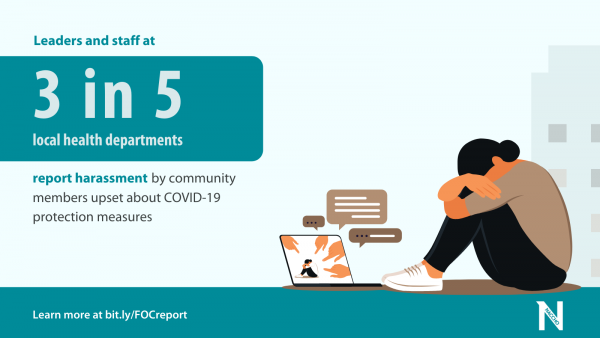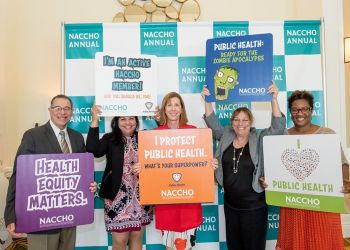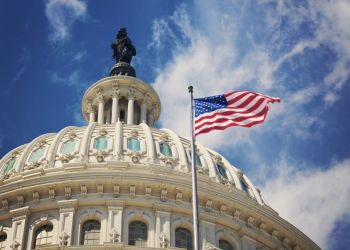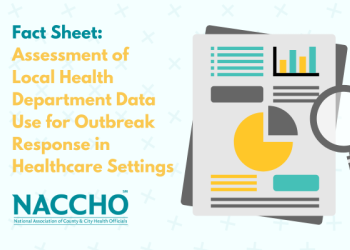“We must invest in the local public health infrastructure to support recovery, rebuilding, and resilience, while bolstering the capacity to effectively prepare for public health threats to come,” said Lori Tremmel Freeman.
Facing Limited Resources and Politically Motivated Threats, Local Health Department Pandemic Response is Challenged
Washington, DC, April 28, 2022 — More than half of America’s local health departments report their leaders and staff were targets of harassment in response to COVID-19 protection measures during the first year of the pandemic, according to a new report from the National Association of County and City Health Officials (NACCHO). NACCHO is the voice of the country’s nearly 3,000 local health departments. The study reveals strained financial and staffing capacities hindering a robust response to COVID-19, forcing suspended public health services, and exacerbating already existing health inequities. Read the full report or view the key facts infographic.
The Forces of Change survey was conducted by NACCHO between October 2020 and March 2021. It is distributed to local health departments across the nation periodically to identify opportunities to strengthen local public health capacity. The 2020 survey provides one of the only mid-pandemic pictures of the circumstances surrounding the local public health response to COVID-19.
“Our nation’s local health departments play a critical role in protecting the public’s health, and this has never been more spotlighted than during the COVID-19 pandemic,” said Lori Tremmel Freeman, NACCHO’s Chief Executive Officer. “However, decades of under-funding and under-staffing stretched the local public health infrastructure to its limits, forcing health departments to de-prioritize essential services to resource frontline response efforts. As the pandemic continues to evolve, our work is not over. We must invest in the local public health infrastructure to support recovery, rebuilding, and resilience, while bolstering the capacity to effectively prepare for public health threats to come.”
KEY SURVEY FINDINGS
Harassment of the Local Public Health Workforce
The rampant politicization of COVID-19 protection measures implemented by local health departments has made the local public health response challenging. Local public health workers on the front line of the response experienced widespread harassment and threats by their communities. Local health departments with staff experiencing harassment were more likely to report staff resignations, reassignments, or firings due to political conflicts.
- More than half of local health departments (51%) reported receiving negative messages and backlash via social media/internet posts about protection orders/actions.
- Nearly two-thirds of local health departments (65%) did not receive any protections from local, state, or federal entities in response to being targeted by harassment or threats.
Local Financial and Staffing Capacity
COVID-19 required an unprecedented level of public health response to mitigate viral spread and prevent deaths. However, years of chronic under-resourcing left local health departments struggling to mobilize quickly. Limited financial and staffing capacity was further strained as priorities rapidly shifted and resources constantly fluctuated during the pandemic.
- More than one in five local health departments (21%) lost at least one position in 2019.
- Nearly three-fourths of local health departments (71%) hired at least one employee specifically to meet the needs of their COVID-19 response – 34% hiring fewer than four and 24% hiring between five and 25.
- Nearly one-fifth of local health departments (16%) reported a lower budget in their most recent fiscal year as compared to the previous fiscal year.
- Of local health departments that reported expenditures specifically for COVID-19 activities, most (65%) spent more than $100,000 between March 2020, and March 2021.
Impacts of COVID-19 on Local Programs and Services
To reallocate capacity for the frontline response, many local health departments were forced to suspend and alter public health services critical to keeping communities healthy and safe, including chronic disease and substance use disorder. As a result, epidemics like the overdose crisis quietly escalated during the pandemic.
- Four in five local health departments (80%) reassigned staff from regular duties to support COVID-19 response, with Environmental Health and Maternal and Child Health programs being most impacted.
- Of local health departments providing certain foundational public health services, 75% reduced their provision of obesity prevention services, 65% reduced drug prevention services, and 60% reduced maternal and child health services.
Since 2008, the Forces of Change survey has been conducted periodically to assess changes in local health department capacity driven by public health trends. In 2020, a set of core questions was distributed to 2,392 local health departments, while a random sample of 905 local health departments received an additional set of questions. A total of 583 local health departments completed the core questions, and 237 completed the module (24% and 26% response rates, respectively).
# # #
About NACCHO
The National Association of County and City Health Officials (NACCHO) represents the nation’s nearly 3,000 local governmental health departments. These city, county, metropolitan, district, and tribal departments work every day to protect and promote health and well-being for all people in their communities. For more information about NACCHO, please visit www.naccho.org.






